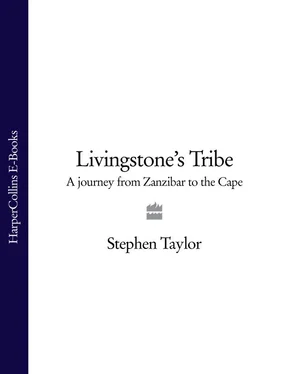This new colony grew rapidly as Royal Navy vessels continued to trawl the coastal waters for illicit slavers and frequently intercepted dhows bound for Muscat. Two years later Steere baptised eight couples, Mbweni’s first converts. An even more ambitious project was in hand. Soon afterwards he set off for the Yao country, 400 miles inland, with a party of thirty-one men, twenty-one women and two children, to restore those plucked by the slavers from Africa to their own. Meanwhile, Caroline Thackeray, East Africa’s first woman missionary, arrived as a teacher at Mbweni’s school.
Caroline was a cousin of the author, William Makepeace Thackeray, and one of those indomitable spinsters of Empire who, with level gaze and firm chin, set out for corners of the world of which they had no comprehension, if not blithely, then at least with conviction. She found the makings of a model community. Steere recorded Mbweni’s progress, ‘a village free and independent, the houses all numbered on little plates of tin in green paint, and the shop stands at the cross-roads’. Soon he was expressing appreciation for Caroline’s success at ‘making the adults and the girls into real Christians’.
She stayed for the rest of her life and by the time she died was the grand dame of the British community, a formidable figure who, though she might have inspired little love, had yet found a purpose and her place in the world. She was steely to the last, even her grave in the parched patch at St John’s betraying no hint of emotion: ‘For 48 years a member of the UMCA. Died Jan 30, 1926.’ Beside her are two young assistants whose deaths from fever are recorded even more dispassionately: ‘Alice Marion Gay, Fell asleep, January 19, 1894’ and ‘Eleanor Mary Barnett, Jan. 8, 1856 – May 16, 1893.’
A short way off, the crumbling walls of the school told their own tale of ruin: a stone stairway overgrown by weeds; stucco cracked and peeling from walls sloping drunkenly askew; passageways to classrooms now open to the sky and piled high with rubble. All that high endeavour, hope and self-sacrifice come to this – a picturesque ruin at the edge of the Indian Ocean, a dilapidated church and three lonely graves.
I dismissed these melancholy thoughts. After all, the fact that the colony had dispersed indicated that Caroline and her ladies had succeeded in equipping the slaves’ descendants for reintegration into the world. That, surely, was no small legacy. In fact, it was only later, when I came across the accounts by Steere’s successor, Frank Weston, that the full extent of Mbweni’s failure became apparent.
Weston arrived in 1908, a very different character from his predecessor. Where Steere was imperious, Weston was diffident. While Steere offered authoritarian leadership, Weston sought to involve Africans in decision-making. It was not long before old hands, and most notably Caroline, were comparing the new bishop unfavourably with Steere. The truth is that Weston was an unusually far-sighted and astute man and had quickly comprehended Mbweni’s real problem. The place looked charming with its well-kept roads, coconut plantations and neat houses; but the forcefulness of the mission leadership, far from equipping its dependants to live beyond its boundaries, had institutionalised them. Left to their own devices, they lacked initiative and motivation. Moreover, proselytising had made little impact. Far from being Christians, most of Mbweni’s inhabitants had reverted to the practice of witchcraft.
Weston tried to confront the challenge. When a woman was accused of leading a devil-worshipping cult of ghouls who dug up the bodies of Christians to eat them, he arranged to have one of her supposed victims exhumed. The body, a child’s, was found intact. Weston put it on show to demonstrate the woman’s innocence. The villagers were unconvinced. Weston himself had cast a spell over the body to restore it, they said. The failure was heart-breaking. ‘Of all workers, none, I think, need so much sympathy as those who work at Mbweni,’ he wrote.
Though painful, the lesson was valuable. The settlement had been an artificial creation and there could be no real community where there were no elders, no social traditions and no sense of common origin. Unusually for a missionary, Weston recognised that for Africans to benefit from European influence, rather than be damaged by it, the institutions of tribe, family and custom needed to be nurtured, not destroyed. But his was a lonely voice and it was, in any event, too late for Mbweni.
I walked back past the church, up the dirt road and at the end found a wooden kiosk. A few men stood around with soft drinks. They paused to greet the mzungu , curious, friendly. I motioned down the road. Did anyone go to the church any more? They shook their heads. ‘People here are Muslims,’ said one.
It was a pretty irony: the slave masters’ faith had endured better than that of their liberators.
I ASKED MY new friend Denis about witchcraft. He nodded enthusiastically. ‘We have many witches,’ he said. ‘Like Pepo Bawa.’
Pepo Bawa was a creature of Pemba, an island twenty-five miles north of Zanzibar and a place even more notorious than Mbweni as a nest of the black arts. Sorcerers from all over central Africa visited Pemba to refine their skills, while the victims of their spells came to be exorcised. Cannibalism, as a form of demonic ritual, persisted; babies were sometimes killed because they cut their top teeth before the bottom ones and were therefore thought to be possessed. It was not only Africans who feared the doings on Pemba. As recently as the 1950s, the Universities Mission to Central Africa published a cautionary booklet by Eleanor Voules, who lived for twenty-five years on the island, in which she related dispassionately accounts of possession and power which she believed to be authentically demonic. When I mentioned Pemba to Canon David, he all but shuddered. ‘A dreadful influence,’ he muttered.
The origins of Pepo Bawa, like accounts of its manifestations, had many versions. According to the most common, however, it was a demon which had taken the form of a fruit bat and tormented the people of Pemba until a powerful spirit medium cast it out and Pepo Bawa crossed the sea to Zanzibar. For years the island had been afflicted. Sometimes the demon was an invisible presence, a malign force which terrorised individuals. Often its victims, both men and women, reported being seized in an embrace and then sexually violated. In some instances, entire neighbourhoods had been reduced to hysteria and although Pepo Bawa had not been active for some months now, and was thought to have moved to the mainland, Denis said most people expected it to return.
We were sitting on the balcony of the Africa House. Denis intrigued me, for although he evidently had no doubts about Pepo Bawa’s existence, he evinced none of the fear which he described with such relish. ‘That is because I am a Christian,’ he said proudly. He looked round. ‘But you can speak to my friend.’ And he called out to another youth.
The young man walked over smiling. Denis motioned to me. ‘Tell him about when Pepo Bawa came to you,’ he said. The smile was dashed, and it appeared to me that the young man’s face actually went from a healthy shiny brown to grey. He shook his head sickly. We offered him a drink but he was clearly shaken and soon left.
Demons apart, Zanzibar appeared to be in something of a spiritual ferment. Christians and Muslims were engaged in a battle for souls and an assertive new breed of missionary had arrived on the island. At St Monica’s, I encountered Frank, a blazing-eyed evangelist from Kent who declared that if only Christians realised the power they had within them, the Gospel would sweep the world. Among his acolytes was a tall Swahili youth of striking presence who had recently been baptised and christened Zephaniah. Born into a Muslim family, Zephaniah had become an outcast, forced to take sanctuary at the cathedral.
Читать дальше












